Military
New war in Nagorno-Karabakh.
27 Sep 2020 Fierce fighting erupted in Nagorno-Karabakh, in the Caucasus region. The enclave is recognised as part of Azerbaijan, but has been controlled by ethnic Armenians since a war ended in 1994.
The latest intense fighting began on Sunday with both Armenia and Azerbaijan blaming each other for the escalation.
Turkey has already declared its support for Azerbaijan, while Russia – which has military bases in Armenia but is also friendly with Azerbaijan – called for an immediate ceasefire.
Karabakh is the Russian rendering of an Azeri word meaning “black garden”, while Nagorno is a Russian word meaning “mountainous”. Ethnic Armenians prefer to call the region Artsakh, an ancient Armenian name for the area.
INF nuclear treaty suspended.
2 Feb 2019 Russia has suspended the Cold War-era Intermediate-range Nuclear Forces Treaty (INF) after a similar move by the United States. President Vladimir Putin said Russia will start work on creating new missiles, including hypersonic ones, and told ministers not to initiate disarmament talks with Washington. 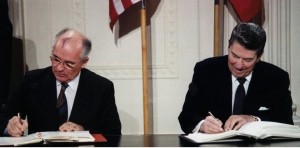
Foreign Minister Sergei Lavrov accused the United States of violating the INF and other arms deals, such as the non-proliferation treaty.
The Americans say they have evidence that a new Russian missile falls within the 500-5,500 km range banned by the treaty. Some US officials have said that a number of 9M729 missiles – known to Nato as SSC-8 – have already been deployed.
President Putin said Moscow would not get dragged into an expensive arms race, and would not deploy short- and medium-range missiles unless US weapons were deployed there first.
Such an arms race would be a major concern for European countries.
The price tag to recapitalize and sustain aging U.S. missiles, subs and bombers is already well in excess of $1 trillion over the next three decades.
Signed in 1987 by the US and USSR, it banned the use of short and medium-range missiles except sea-launched weapons by both countries. China and other countries are outside the INF treaty.
Last January the Chinese Global Times newspaper wrote that the Army had carried out an exercise with an intermediate-range ‘ship killer’ missile called DF-26. According to the Pentagon Beijing has 16 to 30 intermediate-range ballistic missiles, capable of controlling the South China Sea and of targeting US large ships and US naval bases in the western Pacific region.
“Siamo sorpresi osservare i passi non amichevoli verso la Russia da parte degli Stati Uniti da noi non provocati”. Così senza giri di parole il presidente Vladimir Putin ha accolto al Cremlino John Bolton. Il leader russo ha poi rincarato la dose affermando “Noi in pratica non rispondiamo, ma voi continuate”.
Mosca appare assai contrariata per la scelta di Washington di abbandonare presto il Trattato INF del 1987 sui vettori a corto e medio raggio. Al riguardo tuttavia per ora non è stata consegnata alcuna dichiarazione ufficiale.
“Il trattato è superato – ha per l’ennesima volta spiegato il consigliere per la sicurezza americano -. Abbiamo parlato coi russi. Questo è un trattato bilaterale dei tempi della Guerra Fredda, la tecnologia è cambiata, la realtà strategica è un’altra. Dobbiamo riconoscere la nuova realtà”.
Gli USA parrebbero disponibili ad allungare la vita al trattato Start sui sistemi di difesa anti-missilistica in scadenza nel 2021. La Russia sta già realizzando le sue contromosse.
gda
Due giorni di preparazione, gli altri di massima operatività. L’obiettivo delle manovre “Vostok 2018” è di sviluppare la migliore capacità possibile di dislocare truppe e mezzi pesanti dalla Russia occidentale a quella orientale percorrendo migliaia di chilometri. Nei maggiori “War Games” dal 1981, Mosca ha deciso di utilizzare circa 300mila militari, più di un migliaio fra aerei ed elicotteri e 36mila tra carri armati ed autoblindo. Un’ottantina di navi, appartenenti a due Flotte, appoggeranno le mastodontiche esercitazioni terrestri nel mare di Okhorsk, sullo stretto di Bering e nei golfi di Avachinskij e Kronotskij. I russi si terranno, però, lontani dalle isole Curili, territori ancora contesi con Tokyo. Rassicurazioni al riguardo sono state fornite nei giorni scorsi dal presidente Putin al premier nipponico Abe in un incontro a Vladivostok.
Le manovre, ha spiegato il portavoce del Cremlino Dmitrij Peskov, sono “giustificate dal compartimento aggressivo e non amichevole verso la Russia”. La più importante novità rispetto al passato – a parte i numeri di uomini e mezzi impiegati simili a quelli delle battaglie in cui fu impegnata l’Unione Sovietica durante la Seconda guerra mondiale – è che per la prima volta la Cina partecipa a delle manovre “strategiche” (non ordinarie), in cui verrà usato praticamente tutto l’arsenale utilizzabile a disposizione di Mosca. 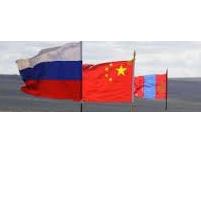
Pechino ha inviato 3200 militari, circa 900 mezzi mobili ed una trentina di velivoli, tutti dislocati nella regione del lago Bajkal. La loro presenza, è stato specificato, serve per sviluppare la “partnership strategica” russo-cinese. A seconda delle dichiarazioni l’ex “impero celeste” viene descritto come un “alleato” prezioso e alle riunioni preparatorie per queste manovre, che non sono rivolte ufficialmente “contro terzi”, i militari di Pechino sono stati accolti con tutti gli onori. Affianco dei cinesi è schierato un piccolo contingente appartenente alle Forze armate mongole. Le principali azioni, ha comunicato il ministero della Difesa federale, si terranno in 7 poligoni del Distretto militare orientale, in 4 dell’Aeronautica e della difesa anti-aerea oltre che nei mari già menzionati.
L’Alleanza atlantica sta monitorando i “War games”. “Ogni nazione – ha detto il portavoce della Nato, Dylan White, – ha il diritto di esercitare le sue Forze armate. La cosa essenziale è che ciò avvenga in maniera trasparente e prevedibile”. Gli esperti occidentali sottolineano come da tempo la Russia si eserciti per conflitti su larga scala. Della stessa opinione è l’autorevole specialista russo, Pavel Felgenhauer, che ha affermato: “E’ in corso la preparazione ad una futura guerra mondiale”.
gda
Così lontano così strategico per l’Italia. Il Caspio rappresenta una rilevante opportunità per diversificare i nostri fornitori di energia. La firma della Convenzione sul suo status giuridico da parte dei Cinque Paesi rivieraschi è un nuovo punto di partenza.
Finora, nel Caspio del nord sulla sponda kazakha l’Eni – con una quota del 16,8% all’interno di un consorzio internazionale – ha investito enormi capitali per lo sfruttamento del giacimento di Kashagan, uno dei più ricchi al mondo scoperti negli ultimi 40 anni. Riserve potenziali: 13 miliardi di barili di petrolio; produzione giornaliera 370mila barili al giorno, ossia circa 62mila bg dell’Eni. Stesso discorso per il gas al sud. Grazie alla prossima costruzione dall’Azerbaigian della pipeline Trans-Adriatic Pipeline (Tap), l’Italia ha la possibilità di lenire la sua dipendenza dalla Russia e dall’Algeria. Non è un caso che il presidente Mattarella si sia recato in luglio a Bakù per tranquillizzare i partner sul completamento del gasdotto, tenendo, però, maggiormente in considerazione le questioni ecologiche. Ed in futuro con la definizione dello status giuridico del Caspio le nostre aziende avranno qui maggiori occasioni per partecipare a progetti più sicuri in campo energetico. 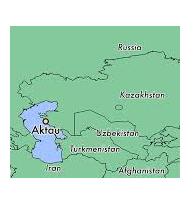
In precedenza, non avendo definito se il Caspio fosse un mare oppure un lago, non si sapeva con certezza a chi appartenessero le risorse del sottosuolo in ben determinate zone. E per la mancanza di un accordo tra i Cinque non si capiva nemmeno cosa si doveva fare per il transito delle condotte. Da oggi è stata chiarita la situazione in una delle maggiori casseforti di idrocarburi, seconda al mondo per riserve dopo quelle del golfo Persico, ossia 50 miliardi di barili di petrolio e 9mila miliardi di metri cubi di gas naturale.
Anche se a livello internazionale le relazioni sono tese, ad esempio russi e tedeschi – suscitando l’ira degli americani – parlano della costruzione del gasdotto Nord-Stream 2 sotto al Baltico. Tutti cercano di avere più fornitori, come la Cina che di fatto impone i propri prezzi a chi l’approvvigiona. Per non essere schiacciata dal suo pesante fabbisogno, l’Italia ha necessità di seguire la stessa strada.
Tornando al Caspio, dopo l’accordo di Aktau il bacino viene considerato un mare per lo sfruttamento del sottosuolo, mentre è un lago per la sua navigazione. Così sono stati salvaguardati gli interessi di russi, kazakhi, iraniani, azeri e turkmenistani. La Convenzione ha anche importanti conseguenze geopolitiche, in particolare non potranno essere dislocate forze militari esterne ai cinque Paesi rivieraschi. Quest’area deve rimanere una retrovia protetta sia per la Russia che per l’Iran.
La necessità di trovare un accordo dopo 22 anni di negoziati è stata dettata dai cambiamenti di alleanze e dalla fine della crisi economica a livello internazionale.
gda
Заявление премьер-министра Великобритании Т.Мэй в парламенте 14 марта о мерах «наказания» России под фальшивым предлогом о якобы причастности к отравлению С.Скрипаля и его дочери расцениваем как беспрецедентно грубую провокацию, подрывающую основы нормального межгосударственного диалога между нашими странами.
Считаем категорически неприемлемым и недостойным тот факт, что правительство Великобритании в своих неблаговидных политических целях пошло на дальнейшее серьезное обострение отношений, объявив о целом наборе враждебных мер, включая высылку из страны 23-х российских дипломатов.
Вместо того, чтобы завершить собственное расследование, задействовать установленные международные форматы и инструменты, в том числе в рамках Организации по запрещению химического оружия, к чему мы были готовы, британское правительство сделало выбор в пользу конфронтации с Россией. Очевидно, что пойдя на односторонние и нетранспарентные методы расследования этого инцидента, британские власти в очередной раз попытались развязать огульную антироссийскую кампанию.
Разумеется, наши ответные меры не заставят себя ждать.
President Vladimir Putin used his annual state of the nation speech to threaten Western nations with a battery of new weapons including an intercontinental nuclear cruise missile and to assure Russians that their lives would improve through enormous new social spending.
Gleb Pavlovsky, a political analyst and former Kremlin consultant, wrote on Facebook that, “From tales about progress, the speech flowed into an open-ended declaration of world war.”
“We would consider any use of nuclear weapons against Russia or its allies to be a nuclear attack on our country,” Mr. Putin said. “The response would be immediate.” 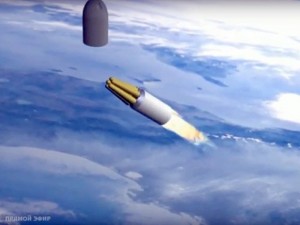
Mr. Putin said that Russia had tested various new nuclear weapons, including a nuclear-powered missile that could reach virtually anywhere in the world and that could not be intercepted by existing antiballistic missile systems. A video illustrating the weapon, which he said was tested at the end of 2017, showed it leaving Russia, slaloming around obstacles in the South Atlantic, before rounding Cape Horn at the tip of South America and heading toward the west coast of the United States.
“We’re not threatening anyone,” Putin said. “Russia’s growing military might is a reliable guarantee of peace on our planet because it ensures the strategic balance in the world.”
“Giving half the time in the annual address to the Russian parliament to a graphic description of new weapons’ capabilities is a measure of how close the U.S. and Russia have moved toward military collision,” Dmitri Trenin, head of the Carnegie Moscow Center, wrote on Twitter. “For the foreseeable future, it looks that the U.S.-Russia agenda will be limited to just one item: war prevention. Good luck to us all.”
See also The Moscow Times, YouTube, DW.
Рогозин, вот новой госпрограммы вооружений.
27 Feb 2018Новая государственная программа вооружения (ГПВ) подписана президентом РФ Владимиром Путиным. Об этом вице-премьер Дмитрий Рогозин сообщил в интервью газете “Коммерсант”
Государственная программа вооружения – документ среднесрочного планирования технического переоснащения армии и флота. Она учитывает анализ и оценки возможных угроз национальной безопасности России.
Создание ГПВ координируется Министерством обороны РФ, которое привлекает к разработке документа другие министерства и силовые ведомства, предприятия оборонно-промышленного комплекса.
… “Стороны отработают совместные действия по обороне кораблей на якорной стоянке, действия по поиску, спасению и конвоированию судов, освобождению захваченного судна, обнаружению и опознаванию целей совместной ПВО“, – сообщил представитель пресс-службы Восточного военного округа по Тихоокеанскому флоту Владимир Матвеев.
Во время учений планируется также нанести совместные ракетно-артиллерийские удары по морским целям, а затем осуществить совместную высадку морского и воздушного десантов на условно захваченный остров…
Deutsche Welle 12.09.2016
“The Warsaw summit is of breakthrough significance. Our message to NATO from the very beginning was clear: in the face of the changing situation in the security environment in our part of the world, in Central and Eastern Europe it is necessary to strengthen the presence and potential of NATO,” President Andrzej Duda has said an interview ahead of a Warsaw summit of the military alliance. “We have said from the outset that there is a need to strengthen the Baltic states and strengthen Poland in these terms through the presence of NATO forces in nations in Central and Eastern Europe.” 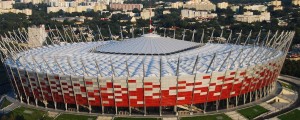
Asked if four battalions of a thousand soldiers each in Poland and the Baltic countries would be enough to deter Russia, Duda said: “This is above all a clear signal what the intentions of the Alliance are. “It is above all a clear signal that the Alliance is tightly-knit, that the Alliance is effective, that the Alliance is able to make decisions and, above all, that it is cohesive, it is together, that it shows solidarity, that we are reacting to what is happening…
“One thing is the most important: that anyone who carries out an act of aggression on a country in which there are NATO troops will at the same time be carrying out an act of aggression on all countries.”
“The security situation in Europe has significantly deteriorated,” Mrs Angela Merkel told the German parliament. “Russia’s actions have deeply disturbed our eastern allies. They therefore require clear reassurance from the alliance.” NATO is expected to approve plans to send four combat battalions of around 1,000 troops to each of Poland, Lithuania, Latvia and Estonia at the Warsaw summit. “If international law and the basic principle of the inviolability of borders are put in question by word and deed, then of course trust is lost,” Mrs Merkel said.
Secretary General Jens Stoltenberg said Allied leaders will take key decisions to strengthen the Alliance’s defence and deterrence and project stability beyond NATO’s borders.
Since the Alliance’s last summit in September 2014 in Wales, NATO has implemented the biggest reinforcement of its collective defence since the Cold War. “We delivered a faster, a stronger, and a more ready Alliance”, Mr Stoltenberg told a press conference at NATO headquarters. “We now need to take the next steps. So at our Summit in Warsaw, we will agree to further enhance our military presence in the eastern part of the Alliance.”
The Secretary General said that Allied leaders will agree to deploy four robust, multinational battalions to Estonia, Latvia, Lithuania and Poland. Further efforts to strengthen the Alliance’s deterrence and defence include a tailored presence in the south-east, based on a multinational brigade in Romania and steps to improve cyber-defence, civil preparedness and the ability to defend against ballistic missile attacks.
The US wants other members in the alliance to share the burden of military spending. NATO wants its members to try to spend 2 percent of their GDP on defense. Many members will want to revise this system in Warsaw as it does not reflect the contribution of each country
Mr Stoltenberg said preparations for holding another meeting of the NATO-Russia Council shortly after the Warsaw Summit are ongoing. “We remain open to dialogue with Russia. The NATO-Russia Council has an important role to play as a forum for dialogue and information exchange, to reduce tensions and increase predictability,” Stoltenberg said.
Welcome
We are a group of long experienced European journalists and intellectuals interested in international politics and culture. We would like to exchange our opinion on new Europe and Russia.
Categories
- Breaking News (11)
- CIS (129)
- Climate (2)
- Energy&Economy (115)
- EU Eastern Dimension (85)
- Euro 2012 – Sochi 2014 – World Cup 2018, Sport (43)
- Euro-Integration (135)
- History Culture (198)
- International Policy (261)
- Military (74)
- Interviews (18)
- Italy – Italia – Suisse (47)
- Odd Enough (10)
- Poland and Baltic States (126)
- Religion (31)
- Russia (421)
- Survey (4)
- Turning points (4)
- Ukraine (176)
- Российские страницы (113)
Archives
- November 2020
- October 2020
- September 2020
- August 2020
- July 2020
- May 2020
- April 2020
- March 2020
- January 2020
- December 2019
- November 2019
- October 2019
- September 2019
- August 2019
- July 2019
- June 2019
- May 2019
- April 2019
- March 2019
- February 2019
- December 2018
- November 2018
- October 2018
- September 2018
- August 2018
- July 2018
- June 2018
- May 2018
- April 2018
- March 2018
- February 2018
- January 2018
- December 2017
- November 2017
- October 2017
- September 2017
- August 2017
- July 2017
- May 2017
- March 2017
- January 2017
- December 2016
- November 2016
- October 2016
- September 2016
- July 2016
- June 2016
- May 2016
- April 2016
- February 2016
- January 2016
- November 2015
- October 2015
- September 2015
- June 2015
- April 2015
- March 2015
- February 2015
- January 2015
- December 2014
- November 2014
- October 2014
- September 2014
- August 2014
- July 2014
- June 2014
- May 2014
- April 2014
- March 2014
- February 2014
- January 2014
- December 2013
- November 2013
- October 2013
- September 2013
- August 2013
- July 2013
- June 2013
- May 2013
- April 2013
- March 2013
- February 2013
- January 2013
- December 2012
- November 2012
- October 2012
- September 2012
- August 2012
- July 2012
- June 2012
- May 2012
- April 2012
- March 2012
- February 2012
- January 2012
- December 2011
- November 2011
- October 2011
- September 2011
- August 2011
- July 2011
- June 2011
- May 2011
- April 2011
- March 2011
- February 2011
- January 2011
- December 2010
- November 2010
- October 2010
- September 2010
- August 2010
- July 2010
- June 2010
- May 2010
- April 2010
- March 2010
- February 2010
- January 2010
- December 2009
- November 2009
- October 2009
- September 2009
- August 2009
Our books




